Monthly archives: February 2022
Heartbeat: Recovery and restoration – when IT updates don’t go to plan
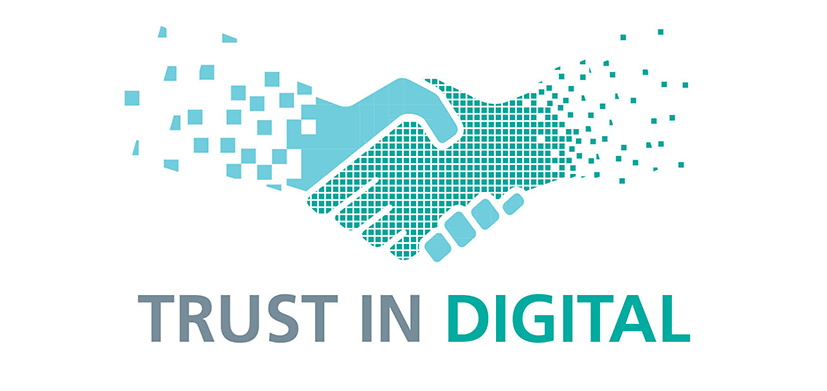
IT – it’s one of those services that we all rely on. We switch on our computers and get on with our jobs, paying little or no attention to what is keeping our data safe and secure – but what happens when things don’t go to plan?
Recently, our IT systems suffered a serious outage which affected over 20 of our IT systems. Many of the systems were recovered within a week and those that required additional testing were recovered the following week. However, some systems are not yet fully recovered including Medisoft, which is the clinical system used in ophthalmology, and the network file shares.
Work continues to recover this information and teams affected have had to work incredibly hard, and in different ways, to continue to provide safe patient care. The Trust’s business continuity plans were enacted quickly as soon as the IT systems became affected. These plans are in place to make sure that we are able to carry on providing the required services, in the event of a serious incident, such as loss of IT systems.
Sharing his insight into the incident, Chief Informatics Officer, Martin Sadler said: “This was an incredibly unfortunate incident, one that should never have happened and was triggered by one of our suppliers pushing out an urgent security update which they then retracted. This action led to a large number of servers becoming unresponsive when we followed their advice and removed the update.
“As a Trust, we have put a lot of time and effort in to building a new infrastructure of scalable and flexible virtual servers. This means instead of separate computers for each server, we have high performance virtual servers that are able to share their resources and allow us to manage our data safely. This outage effectively took one of our virtual servers out of action and affected a range of services.
“Thankfully departments were quickly able to institute their business continuity processes as our IT teams got to work resolving the issue.
Working round the clock and with the support of an international data recovery team we were able to quickly bring many of the affected systems back online.
“Unfortunately, some systems such as the electronic patient record in BMEC were significantly affected and work continues to recover these.
“I would like to take this opportunity to thank colleagues across the Trust who were affected by this outage and who have had to work through business continuity processes on top of the COVID-19 surge to continue to care for patients.
“We are currently conducting an internal review of the impact and response to this outage in a bid to improve our processes. We will also be working with external partners to complete an independent review into the cause of the outage and to review our processes to ensure it never happens again.”
If you have ongoing issues following the recent service outage, please ensure you report these to the IT service desk on 0121 507 4050.
Heartbeat: Breast surgery team commended by patients
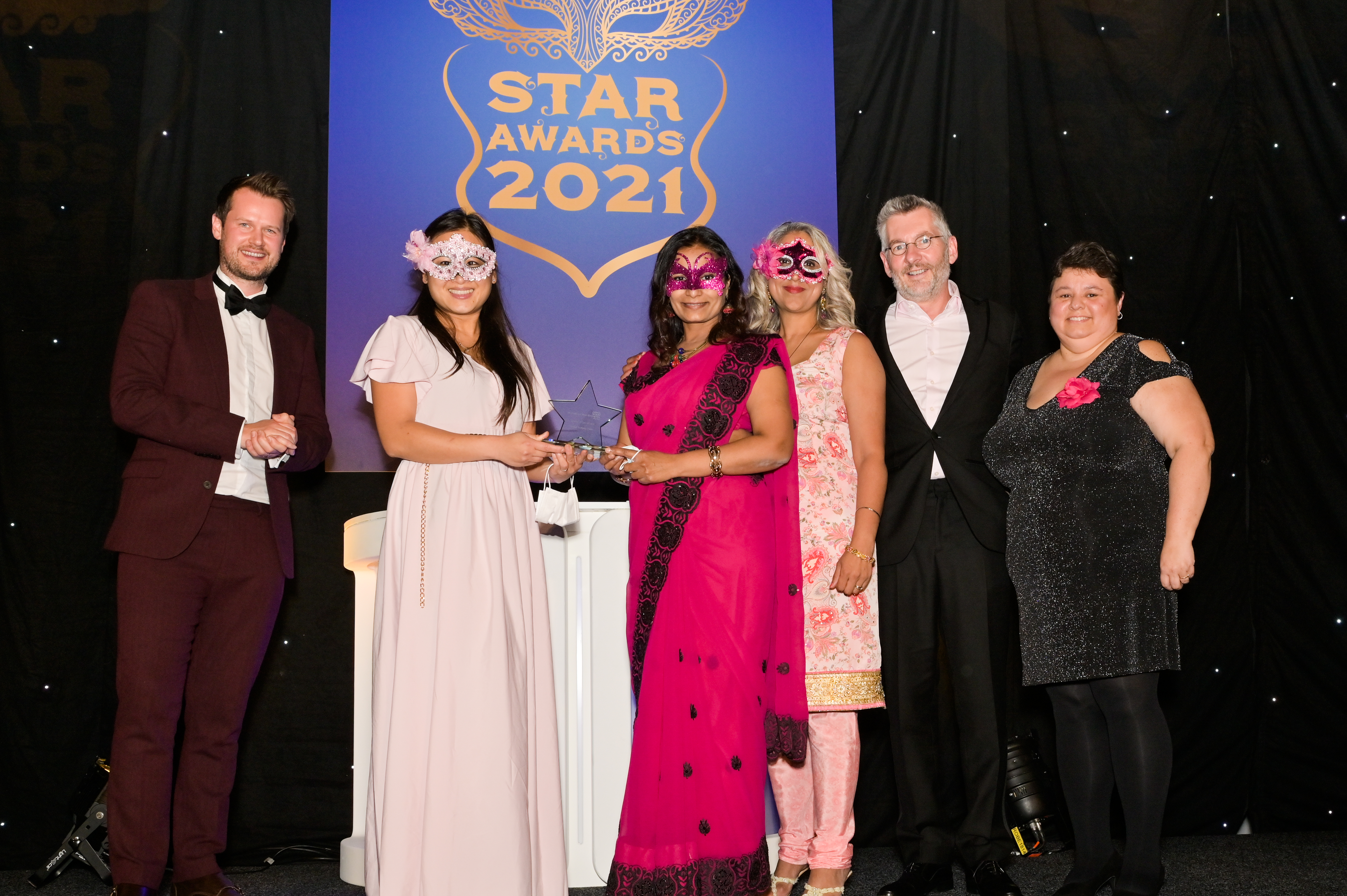
Every year our patients, visitors and carers have the opportunity to nominate a service that has truly made a difference to them or their families as part of the annual Star Awards.
At the 2021 ceremony, the breast surgery team came out tops in the Quality of Care category which recognises colleagues and teams that have provided excellent care in line with our quality plan, producing improved outcomes for patients and those who have consistently upheld and demonstrated our nine Care Promises.
Heartbeat caught up with Melissa Tan, Consultant Oncoplastic and Reconstructive Breast Surgeon who was delighted with the win.
She said: “We were so surprised to learn of the nomination and when we were announced as winners on the night, it was truly humbling. Each member of this team strives to work in partnership with our patients, where they are educated and empowered throughout their treatment journey. We were absolutely delighted to see that our work is having such an impact on our patients and their loved ones.”
The breast surgical team has a vision to provide high quality, individualised patient centred care. The team consists of seven consultants (four breast surgeons and three oncoplastic and reconstructive breast surgeons), one nurse consultant, one speciality doctor, one trainee, two fellows, and five secretarial and administrative staff.
They work within a multi-professional and multi-disciplinary team environment (including radiology, breast screening, pathology, oncology, genetic, and psychology teams) to formulate the best possible management plan. The service is also supported by six Macmillan breast specialist nurses.
Melissa also told us how the team managed to maintain a full service during the pandemic. “Despite the challenges the team faced during the COVID-19 pandemic, where some team members were deployed or isolating, we adapted. Each member went above and beyond their existing roles to ensure a high quality service was maintained.
“Urgent two week wait referred patients were triaged and assessed and the cancer detection rate did not change. This triaging system was peer reviewed, published and later refined. Patients needing surgery were operated according to risks stratification with some having their procedures in the NHS and others with private providers as appropriate.
“The team’s day case surgical pathway is well recognised and the British Association of Day Surgery has invited us to share our ambulatory surgical practice. The unit’s day case and 23 hours stay procedures for oncoplastic and reconstructive surgeries like, reduction mammoplasties, breast implant reconstructions, and chest wall perforator flaps reconstructions has gained much interest. Breast conservation rates have increased with fewer women losing breasts. Our expertise is being disseminated nationally and internationally.
“We are most proud that we came out of the pandemic with no backlog of cancer cases and we were continually meeting our targets. This is a true reflection of our effectiveness and efficiency.”
The team has also shown innovation by introducing new services to patient pathways. Non-palpable breast cancers were surgically excised using modern radiofrequency identification localisation TAG technique resulting in improved patient experience. Oncotype test, a multigene assay was utilised to help spare women from having chemotherapy. Patients were entered into an end of surgical treatment Patient Initiated Follow Up programme, where not only did they have defined annual surveillance investigations, but also given open access to their Macmillan nurses via a telephone messaging system.
Melissa added: “As part of the survivorship programme, patients are also invited to attend a Holistic Need Assessment clinic to ensure they are well supported to live well and beyond cancer diagnosis and treatment. A virtual MDT to review patients after five years of surgical treatment was also introduced, assessing each patient’s risks and benefit of extended endocrine treatment prior to discharging patient care.
“The breast surgical team has worked hard and will continue to work towards achieving their common goal in delivering a service that is of high quality and individualised.”
Heartbeat: MIS lead the way in equality, diversity and inclusion
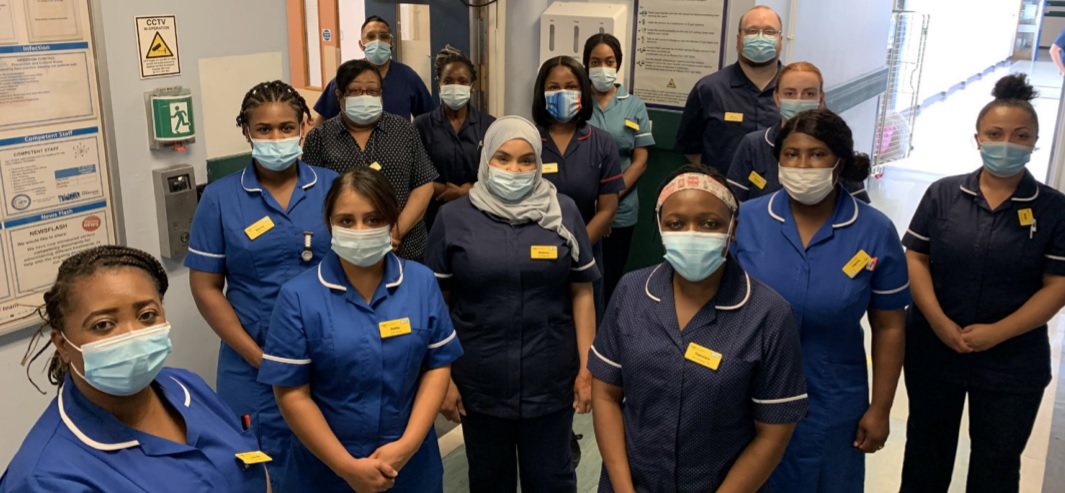
At our 2021 Star Awards back in October, our medical infusion suite won the award for Equality and Diversity Champion.
This award recognises an individual or team that has demonstrated engagement internally or externally with a minority group or diverse groups from the Sandwell and West Birmingham community to deliver improved services for colleagues, patients or carers.
The medical infusion suite (MIS) are the perfect example for diversity with colleagues from all over the world who speak different languages, have different faiths and sexual orientation.
The MIS are part of COVID/tocilizumab infusion which means that the team administers the treatment across the entire organisation in places such as ITU, respiratory and AMU. The team is nurse led and going forward into 2022, will have nurse prescribers which will help provide greater support to our doctors and prevent delays of treatments and hospital admission.
Shehnaz Mohammed, MIS manager was delighted when she had heard her team had won the prestigious Award for Equality and Diversity Champion and said: “MIS is a perfect diverse team which consists of colleagues from Yemen, different part of Africa, Jamaica, Portugal and England. We have multilingual colleagues who speak Punjabi, Hindi, Arabic, Swahili, Nigeria, Ghanaian, Portuguese and Sierra Leone. Our staff are multi faith of Christianity, Islam, Sikh and Atheists, with various sexual orientated choices. We respect and value one another believes and choices with none judgmental attitude and we work together as one positive team, all of which makes us perfect for this award.
“In addition to this, we are one of a few teams in the Trust who are competent and trained to administer Tocilizumab infusion for (COVID) patients.”
Jenny Mynett, Matron believes MIS are deserving of winning the award and should feel proud of what they have achieved.
She said: “Shehnaz and the MIS team are a shining example of multiple cultures and ethnicities all working hard for the same goal and going above and beyond and exceeding expectation.
“Though the team has very diverse backgrounds, different beliefs and cultural values, they all work cohesively and exceed expectation on MIS whilst maintaining cultural sensitivity to patients and each other’s needs.”
Vegan menu: 28 February

Hallam restaurant, Arches, Boaters and Rowley Coffee Pot will be offering a vegan theme menu on Monday 28 February so be sure to drop by for a bite to eat.
To see the full menu please click here.
Heartbeat: New technology revolutionises eye care at SWB
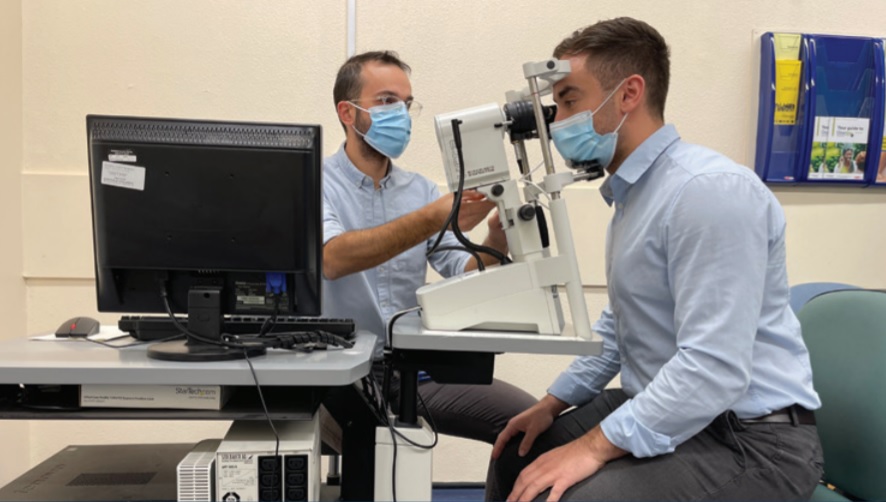
In the modern world, we are always updating and revising technology but once in a while, something revolutionary is introduced and in this case, it is the new In-vivo confocal microscopy (IVCM) at BMEC.
This is an invaluable addition to the cornea service for what is otherwise the second largest ophthalmology unit in England after Moorfields Eye Hospital in London.
“IVCM is a specialised and useful investigation modality used in ophthalmology,” said Dr Matthew Azzopardi, Junior Academic Research Fellow at Birmingham and Midland Eye Centre.
“In combination with polymerase chain reaction (PCR) swabs and culture, it is the current clinical standard for diagnosis of Acanthamoeba Keratitis (AK). This is a rare and sight threatening cornea infection which can lead to blindness if left untreated. Unfortunately, the diagnosis of AK is often delayed due to lack of a gold standard diagnostic technique and due to the difficulty of clinical diagnosis as its initial presentation can mimic other types of infection. It is a type of single cell protozoan organism which can be found in the natural environment including water and soil, with contact lens wearers being most at-risk.
“In addition, IVCM is used to aid the diagnosis of other cornea conditions including cornea inflammatory eye disease, cornea neuropathy, and other infections such as cytomegalovirus (CMV).”
Before the Trust had this technology, BMEC could not offer this service which meant many of our patients would be referred to other places across the country such as London, Southampton and Wolverhampton for IVCM which had a significant impact in the care given by SWB as it caused disruption to the patient journey and delayed treatment.
When asked about the impact ICVM has had, Dr Alberto Recchioni, Research Imaging Optometrist said: “Feedback from our patients has been excellent with one patient saying that the process of going through the IVCM diagnosis was thorough and they felt at ease and glad that they didn’t have to travel elsewhere. Patients also reported that they were pleased that the source of infection could now be visualised directly and the images shown to them immediately.”
He added: “Feedback from my clinical colleagues has also been positive with many saying that their confidence has increased in regards to making the diagnosis of AK when used in conjunction with other diagnostic techniques such as PCR.
“Clinicians and ophthalmologist are now able to directly refer patients from BMEC to the academic unit at Sheldon Block for direct imaging of the cornea with IVCM.”
The Trust is hopeful that moving forward we can use IVCM as an invaluable diagnostic aid as well as research tool. Currently, further work is being done to look at the sensitivity and specificity of IVCM for a variety of eye conditions, especially when used in conjunction with other tools such as PCR and cultures.
Heartbeat: A long and distinguished career – focus on Dr Bill Thomson
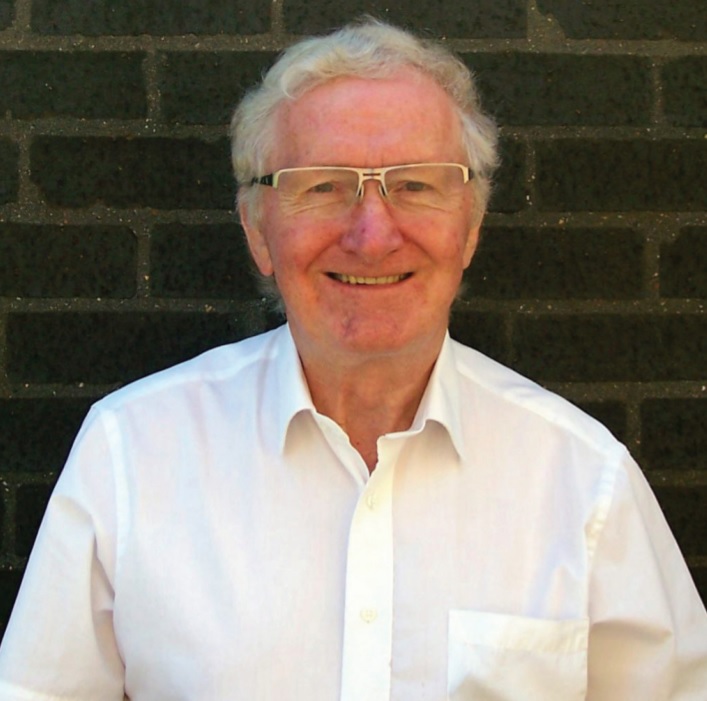
Dr Bill Thomson, newly retired former Head of Physics and Nuclear Medicine, is widely recognised across our organisation as an innovator, a colleague that has dedicated his career to patient care. His diagnostic work alone has helped to treat countless patients, and that’s just the start.
This accolade comes after working 50 years in the NHS, 37 of which have been at SWB. Bill graduated in 1971 with a degree in physics and went on to complete his PhD. Since joining our Trust, he has worked across several projects that have seen him recognised for his contributions to science and nuclear medicine, one being the prestigious Norman Veal Award by the British Nuclear Medicine Society.
Throughout his career, Bill has made numerous developments in nuclear medicine. He has featured in over 500 publications and shared his expertise at many presentations.
Bill’s colleagues paid tribute to him when nominating him for our Distinguished Service Award. One colleague remarked: “There are multiple reasons why Bill deserves this award. Beyond longevity (he has stuck it out for at least 30 years), he gives his complete and utter best every day.
“He is kind and supportive to his colleagues. Bill gives every person an Easter egg, and every single person gets a bottle of wine or a box of chocolates at Christmas. He always has time to help you. Bill is a proper scientist. He loves nothing more than tinkering around with bits of tubing and radioactive counters to try and solve a problem.
“He helped set up our national Krypton gas generator service and has steered our nuclear medicine service over the years. He has successfully submitted many research papers, and his passion for research and science has never waned. But better than that, he has a passion for the department and for elevating his colleagues, which is wonderful.”
Speaking of being recognised with a Star Award, Bill remarked: “It’s a great honour to receive the Distinguished Service Star Award from the Trust. I’ve been very fortunate to work in a department where everyone works together with a constant vision for improving our studies for the benefit of our patients. They really are just a fantastic team!
“Nuclear medicine is constantly evolving and the department has been at the forefront of a lot of these developments. Over the last five years or so we have presented more papers at the nuclear medicine annual conference than any other UK department. I love what I do, which is why I have had 50 years in nuclear medicine. I’m happy to now have handed over the reins, but I am still involved in some research projects, and have given two invited talks since retiring.”
Share your experiences of Safety Huddles
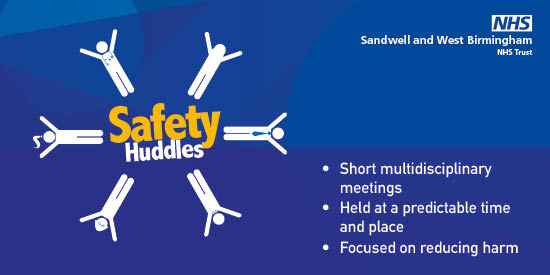
Safety huddles are a national programme to improve safety by encouraging multidisciplinary teams to have a quick but focussed discussion, to agree actions and to act in a timely and collaborative manner to prevent patient harm.
Colleagues are now being encouraged to feedback on their experiences of safety huddles in a Trust-wide continuous improvement plan.
Please take the time to complete the form linked below to highlight your experiences of Safety Huddles https://forms.office.com/r/nXvmdT9fMj
If you attend safety huddles in multiple clinical areas, please fill in one form for the huddles in each area.
Declaring interests
The Trust are introducing a new way of declaring interests through ESR. As NHS colleagues, we need to declare any interests – including gifts, hospitality or sponsorship received from third parties – to ensure transparency on how public funds and assets are being used and accessed.
It’s important to know that having an interest isn’t necessarily a problem – it’s the perception that can be damaging to individuals and the Trust, especially if something isn’t declared – but it is necessary to be open about what interests we have so that they can be taken into account in the appropriate way.
All colleagues are required to declare any interests on appointment and again if they change job or their circumstances change (e.g. they take on a second job outside of the Trust). Additionally, all ‘decision-making staff’ – that is those who are:
- Executive and Non-Executive Directors (including Associate Non-Executive Directors)
- Those at Agenda for Change band 8c and above
- Medical consultants
- All staff in the procurement team
- All staff listed as having delegated financial authorities per the scheme of reservation and delegation
All of the above are required to make a declaration at least twice a year, even if it’s just to say they have no interests to declare.
Soon you will be able to make your declarations through a specific module on ESR called ‘Conflicts of Interest’.
Some key tips on what to declare:
- Any non-cash/voucher gift (e.g. from a patient) of over £50 (gifts under £50 don’t need to be declared but it’s good practice to)
- Any sponsorship received from suppliers/individuals
- Any secondary employment or private practice.
Colleagues should also always:
- Decline gifts of cash or vouchers (to individuals) – cash donations can be made as a donation to the Trust charity
- Decline any gifts from suppliers or contractors doing business (or likely to do business) with the Trust.
There is helpful specific guidance from NHS England for the following staff groups:
- Q&A for managers: https://www.england.nhs.uk/wp-content/uploads/2017/09/coi-qa-provider-managers.pdf
- Q&A for medical colleagues: https://www.england.nhs.uk/wp-content/uploads/2017/09/coi-qa-medical-staff.pdf
- Q&A for clinical colleagues: https://www.england.nhs.uk/wp-content/uploads/2017/09/coi-qa-clinical-staff.pdf
The Trust’s Associate Director of Corporate Governance/Company Secretary, Dan Conway can also help provide advice on interpretation of the guidance; however decisions about what to declare or not are the responsibility of individuals. Please don’t hesitate to contact Dan by emailing swbh.declarations-admin@nhs.net if you have any questions.
Dan will also be offering the following drop in sessions on Microsoft Teams, for a live demonstration of how to make your declarations on ESR and a Q&A session.
See joining details for these sessions below:
- Session 1, Friday 11 March from 9am (session will last no longer than 30 minutes): Click here to join the meeting
- Session 2, Thursday 24 March from 3pm (session will last no longer than 30 minutes): Click here to join the meeting
COVID Vaccine FAQs on legislation
As you may know, a government review will take place around the Vaccination as a Condition of Deployment legislation.
The Government’s decision is subject to a parliamentary process and requires further consultation (which has now closed) and a vote to be passed into legislation.
We have developed some FAQs regarding issues about the COVID-19 vaccine which you can read below:
At the present time we are continuing to confirm the vaccination status of all our staff. Please ensure that you confirm your status to the HR email advice line swbh.hr-advice-for-covid-19@nhs.net if we have written to you to say we have no record of you having first and second doses of the COVID-19 vaccine. Managers will also continue to have conversations with staff regarding their vaccination status.
We are expecting additional information on the review to come to the NHS in due course and we expect to take a consistent approach with other Trusts in the country, and particularly within the Black Country and West Birmingham Integrated Care System.
LGBT History Month – creating our future: 17 February
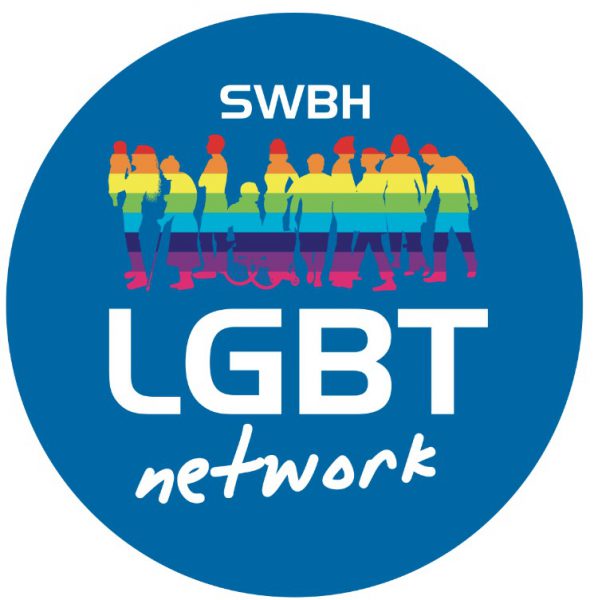
As you may be aware, February marked the start of LGBT History Month and to celebrate the month. our LGBT Staff Network at the Trust have put together comprehensive list of events associated with the month which colleagues can attend throughout February.
Creating our future – Hosted by University Hospitals Birmingham NHS Foundation Trust, Thursday 17 February, 11am – 12pm: At this online event you will hear from:
- Dr. Michael Brady, NHS England’s LGBT+ Advisor, speaking about LGBT+ health inequalities and offering practical takeaway advice to apply back in your workplace to support LGBT+ patients and staff.
- Dr. Lucy Kelsall-Knight, Lecturer in Children’s Nursing at University of Birmingham, speaking about the inequalities faced by LGBT+ parents, share her personal story of the inequalities faced as a parent in a same sex relationship, and the systemic changes needed to ensure all parents are treated fairly.
Click here to find out more and join this event.
The full list and attendance details can be accessed below in the LGBT History Month events list
← Older items Newer items →